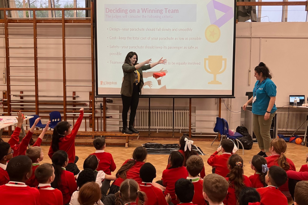Posted:
15 July 2025
Benefits of CREST Accreditation

The transition from primary science learning to secondary school can be a big jump for young people; it’s when their teamwork skills and understanding of how to design and conduct research work becomes more highly developed.
Discovery CREST Awards, usually completed by students aged 10-14, can be the perfect bridge between the two phases of education. Discovery projects are done in groups and take around five hours, meaning they can be completed in one day, or over several separate sessions e.g. in a STEM club.
While we have a selection of CREST Discovery projects in our Resource Library, we also work with non-profit organisations, educational resource providers and other STEM*-focused organisations to CREST accredit their resources. Enabling students who complete their activities to receive CREST Awards.
This is just what The Smallpeice Trust, an educational charity “that inspires young people to pursue careers in science and engineering through events and workshops”, do. We spoke to Oliver Atkins-Wood, Head of Content and Impact at Smallpeice, about the benefits of having their Engineering focussed resources and workshops accredited, and the importance of this type of learning.

How did Smallpeice become interested in becoming a CREST Awards accredited partner?
We were excited by the opportunity becoming an accredited partner provided to ensure the STEM challenges we offer are of a standard that allows students to achieve a nationally recognised award. This accreditation also enables our supporters to invest in young people's futures by funding opportunities for them to gain this valuable recognition.
During the initial stages of partnering with CREST, how beneficial was the CREST framework when thinking about the structure of your activities?
The CREST framework has proved valuable in helping us standardise the structure of our school STEM days, ensuring all of our internally-developed activities have the option of embedding CREST Awards. Discussions with the CREST team provided valuable insights into the importance of incorporating an externally assured and widely recognised award into our content, while ensuring alignment with the broader curriculum. The accreditation process, including the challenges set by CREST, has been particularly beneficial in sharpening our focus on key areas and competencies. This ongoing collaboration continues to refine our development approach, ensuring it remains relevant and responsive to the evolving needs of children, young people, and teachers.
Why is having quality-assured hands-on STEM activities so important for teachers?
Activities like this play a crucial role in enhancing teaching and learning - inspiring students to engage actively with STEM. External validation means that these activities meet high standards of engagement, curriculum alignment, and educational impact. This gives teachers confidence in the resources delivered, knowing they are implementing reliable, tested activities that foster critical skills like problem-solving, creativity, and teamwork.
External oversight ensures these activities are designed to support diverse learning styles, creating accessible and effective opportunities for all students. By bridging the gap between abstract concepts and practical application, externally-assured activities ignite students' curiosity and lay the groundwork for them to pursue further studies and careers in STEM fields, while building core skills.
In recent years there has been a shift towards breaking down stereotypes and supporting students from all backgrounds and abilities. What developments have you been making to support this shift, and has the British Science Association and CREST been useful in helping you achieve this?
The accreditation provided by CREST, delivered through our free-to-school STEM Days, helps level the playing field by recognising and celebrating the achievements of children and young people from underrepresented backgrounds. As an organisation, we are dedicated to make STEM experiences accessible to all, with a particular emphasis on underrepresented groups, including girls and socio-economically disadvantaged students. We are increasingly focused on engaging younger children to spark an early interest in STEM, which can be nurtured through our comprehensive programme of activities spanning schools, local communities, courses, and scholarships. The CREST framework supports this multi-faceted approach, providing structure and recognition at various stages of the STEM journey, and empowering children and young people to thrive regardless of their background or abilities.
What do you think the positive, long-lasting effects can be for students receiving recognition and a CREST certificate for their work?
Recognising children and young people’s achievements in STEM builds their confidence and reinforces the belief that anyone can pursue a career in engineering, if they choose to. CREST Award certificates offer meaningful acknowledgment of development and success, and the long-lasting impact lies in inspiring further exploration of STEM subjects. By fostering a sense of accomplishment and possibility, CREST helps empower today’s young people to envision themselves as the next generation of scientists, engineers, innovators and inventors.
Would you recommend CREST Accreditation to other organisations and why?
A CREST Award offers assurance that children and young people have achieved a recognised standard, instilling confidence in teachers and parents that quality benchmarks for a particular activity or intervention have been met. It demonstrates that activities are thoughtfully designed to support growth, development, and alignment with educational goals. We strongly recommend that organisations involved in STEM outreach consider adopting the CREST framework. It is a valuable tool for ensuring the quality, effectiveness, and impact of STEM interventions, whether delivered in schools or community settings.
The Smallpeice Trust chose to have their workshops accredited for Discovery Awards, as this is best suited to a day-long workshop. However a challenge or projects could be accredited for any level of CREST Award, if it fits the relevant criteria.
*STEM is an acronym for science, technology, engineering and maths
If you would like to become a CREST accredited partner?
